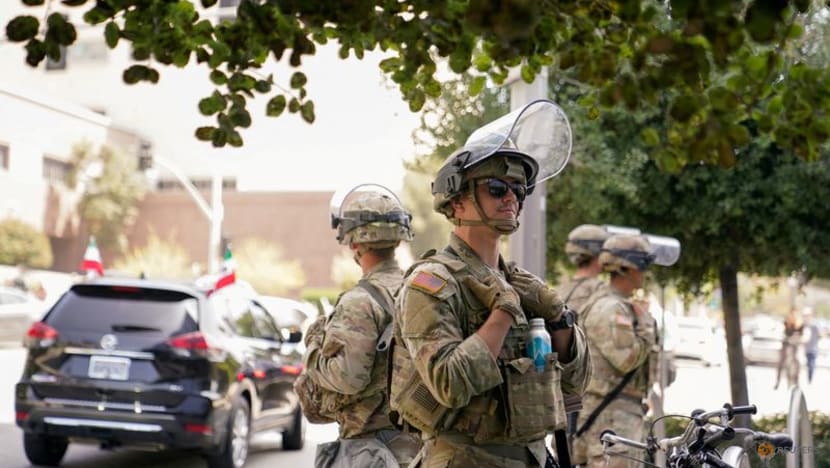US court lets Trump retain control of California National Guard for now

US Marines stand watch as people protest against US President Donald Trump's policies and federal immigration sweeps during a No Kings Day demonstration in Los Angeles, California, US, on Jun 14, 2025. (Photo: REUTERS/David Ryder)
WASHINGTON: A US appeals court let Donald Trump on Thursday (Jun 19) retain control over California's National Guard while the state's Democratic governor proceeds with a lawsuit challenging the legality of the Republican president's use of the troops to quell protests and unrest in Los Angeles.
A three-judge panel of the San Francisco-based 9th US Circuit Court of Appeals extended a pause it placed on US District Judge Charles Breyer's Jun 12 ruling that Trump had called the National Guard into federal service unlawfully.
Breyer's ruling was issued in a lawsuit against Trump's action brought by Governor Gavin Newsom.
Breyer ruled that Trump violated the US law governing a president's ability to take control of a state's National Guard by failing to coordinate with the governor, and also found that the conditions set out under the statute to allow this move, such as a rebellion against federal authority, did not exist.
Breyer ordered Trump to return control of California's National Guard to Newsom. Hours after Breyer acted, the 9th Circuit panel put the judge's move on hold temporarily.
Amid protests and turmoil in Los Angeles over Trump's immigration raids, the president on Jun 7 took control of California's National Guard and deployed 4,000 troops against the wishes of Newsom. Trump also ordered 700 US Marines to the city after sending in the National Guard. Breyer has not yet ruled on the legality of the Marine Corps mobilisation.
At a court hearing on Tuesday on whether to extend the pause on Breyer's decision, members of the 9th Circuit panel questioned lawyers for California and the Trump administration on what role, if any, courts should have in reviewing Trump's authority to deploy the troops.
The law sets out three conditions under which a president can federalise state National Guard forces, including an invasion, a "rebellion or danger of a rebellion" against the government or a situation in which the US government is unable with regular forces to execute the country's laws.
The Justice Department has said that once the president determines that an emergency that warrants the use of the National Guard exists, no court or state governor can review that decision.
Trump's decision to send troops into Los Angeles prompted a national debate about the use of the military on US soil and inflamed political tensions in the second most-populous US city.
The protests in Los Angeles lasted for more than a week, but subsequently ebbed, leading Los Angeles Mayor Karen Bass to lift a curfew she had imposed.
California argued in its Jun 9 lawsuit that Trump's deployment of the National Guard and the Marines violated the state's sovereignty and US laws that forbid federal troops from participating in civilian law enforcement.
The lawsuit stated the situation in Los Angeles was nothing like a "rebellion". The protests involved sporadic acts of violence that state and local law enforcement were capable of handling without military involvement, according to the lawsuit.
The Trump administration has denied that troops are engaging in law enforcement, saying that they are instead protecting federal buildings and personnel, including US Immigration and Customs Enforcement officers.
The 9th Circuit panel is comprised of two judges appointed by Trump during his first term and one appointee of Democratic former President Joe Biden.
















